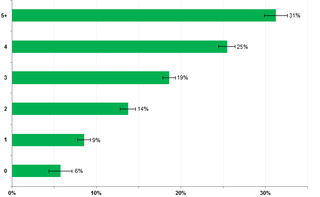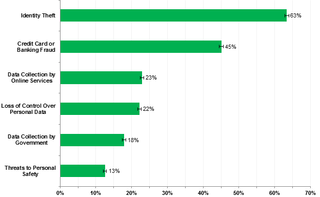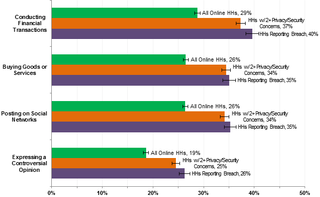Weak Internet Privacy Chills Economic Activity, Says NTIA Study
The National Telecommunications and Information Administration (NTIA) performed a survey on internet users and discovered that Americans are increasingly more concerned with their privacy online. These concerns have prompted many Americans to reduce their online activity. The survey containing privacy and security questions was done on 41,000 households with at least one internet user.
Higher Internet Usage Equals More Breaches
The study showed that 19 percent of the households have been affected by an online security breach, identity theft, or other malicious activity during the year prior to the July 2015 survey.
The survey also found that only nine percent of those who use one device to connect to the internet experienced a security breach, whereas 31 percent of the households that had five internet-connected devices reported a breach. This shows that multiple devices increase the risk of having your data exposed to attackers. This is also bad news for the Internet of Things, which is supposed to connect everything around us to the Internet.

Of the households that used mobile data to connect to the internet outside of the home, 22 percent experienced a security breach, compared to the 11 percent who didn’t use mobile data. This could be read as the more you use the internet, the higher your chance of experiencing a security breach.
Identity Theft, Online Tracking As Biggest Concerns
By far the biggest concern of 63 percent of the people surveyed was identity theft, followed by credit card or banking fraud, data collection and online tracking by the government, and threats to personal safety.

The study also found that of those who had already experienced a security breach, 30 percent were concerned with online tracking by services, whereas only 21 percent of those that weren’t affected by any type of hacking worried about online tracking.
Weak Privacy Has Chilling Effects On Internet Activity
The more shocking finding by the NTIA was that 45 percent of the households reported that these concerns stopped them from doing financial transactions online (35 percent of the households), buying goods or services (33 percent), or expressing their political views on social media (29 percent). Almost 30 percent refrained from at least two of these activities.
Stay on the Cutting Edge
Join the experts who read Tom's Hardware for the inside track on enthusiast PC tech news — and have for over 25 years. We'll send breaking news and in-depth reviews of CPUs, GPUs, AI, maker hardware and more straight to your inbox.
“NTIA’s initial analysis only scratches the surface of this important area, but it is clear that policymakers need to develop a better understanding of mistrust in the privacy and security of the Internet and the resulting chilling effects. In addition to being a problem of great concern to many Americans, privacy and security issues may reduce economic activity and hamper the free exchange of ideas online,” said Rafi Goldberg, Policy Analyst, Office of Policy Analysis and Development at NTIA.
Seeing how the U.S. House recently passed the Email Privacy Act unanimously, and how it has mostly ignored the FBI’s pleading to insert backdoors into American technology products and services (which would’ve led to even less trust in using these services), the House policymakers may have already understood this message. The biggest obstacle seems to be the Senate right now, where prominent leaders are still trying to pass anti-encryption legislation and have already succeeded in further eroding other privacy laws through “cybersecurity” legislation.

As the NTIA’s study shows, privacy is not just some theoretical thing that people may or may not need. Privacy also means data protection, which everyone needs in one way or another. The data that is protected can be anything from sensitive conversations or photos that people may not want everyone to see to social security and credit card numbers, which should be protected with the most advanced technologies and protocols (including end-to-end encryption).
Internet users also need to trust that the data they allow companies to collect about them isn’t easily handed over to various local or national governments without those requests going through rigorous and trustworthy judicial processes.
Despite all of this, multiple arms of the U.S. government are trying to further weaken privacy and data protection technologies from which everyone benefits in order to make it easier for them to catch a few criminals, while increasing the number of gag orders they deliver to companies when requesting user data. As this study and others we’ve seen in the past show, these actions haven’t been without consequences, and they can actually negatively impact internet and economic activity.
Lucian Armasu is a Contributing Writer for Tom's Hardware. You can follow him at @lucian_armasu.
-
Nuckles_56 So in other words the government's plans to use the internet for mass surveillance are resulting in less usage of the internet. So I wonder how exactly this is making it easier for them to 'catch' the criminals exactlyReply -
mavikt ...and Microsoft putting more fuel on the fire with Windows 10...Reply
My prediction is that these numbers are going to get worse as people in general gets more conscious about the privacy bits and various governments trying to hamper security adoptations. -
the associate Nuckles_56 is right, if the average Joe is avoiding using the net from all this spying nonsense, you would have to be pretty damn stupid/naïve/full of shit to claim you can successfully spy on "criminals" and "terrorists"Reply
Most Popular


